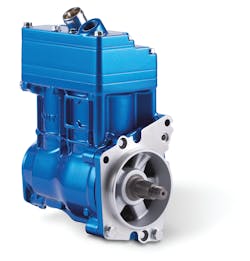Voith's Two-Stage Air Compressors Increased Power and Reduced Fuel Consumption
Voith's two-stage air compressors offer a range of benefits to commercial vehicle operators including a high degree of energy efficiency, low-emissions, reduced weight and longer service intervals.
The key to this range of benefits is an inter-cooling system that ensures consistently high air quality and noticeably lower fuel consumption. An extended compressor lifetime is another advantage of the two-stage principle which benefits all bus and truck operators using any Voith air compressor.
The extent of the demand for Voith air compressors can be seen in the figures noted by the Zschopau site. The team there only began developing and setting up production for air compressors back in 2009. Yet within the last two years, Voith has manufactured 100,000 compressors which are now in use in trucks and buses worldwide, working to ensure higher vehi-cle efficiency. The latest compressor generation the LP 725 and the LP 490, presented at the IAA trade fair, are based on a cast aluminum con-cept. These compressors in light-weight version are already being incorpo-rated as standard into Mercedes Benz's Actros, Antos and Arocs trucks, as well as its latest generation Euro 6 engine buses Travego, Citaro and Set-ra, to name but a few. A two-stage Voith air compressor with a gray-cast iron design is integrated as standard into MAN city buses fitted with D08 and D20 diesel engines, as well as Volvo Buses Sweden.
The two-stage principle features an intermediate chamber with cooler be-tween the suction and pressure chamber. This allows air to be cooled as it makes its way from the first to the second compression stage. Lowering the temperature of compressed air allows the compressor to achieve an up to 85 percent longer duty time, increases air availability and improves energy efficiency. This is because the intercooling set-up performs a compression function and thus ensures low temperature levels throughout the compres-sion process.
The intercooler's functioning principle ensures a decrease in power consumption during transport. With aluminum construction, this model is roughly 7 kg lighter than conventional single-stage compressors. In addition, the automatic idle system (SLS) reduces consumption when the vehicle is in non-transport mode. As the demand for compressed air is particularly high in city buses, these vehicles are able to make full use of the two-stage Voith air compressor's efficient operation. In doing so, the unit is able to save up to 1 liter of diesel fuel for every 100 kilometers.
Another advantage of this compression is that it reduces the mechanical strain on pressurized components, thus extending the lifetime. During compression, temperatures of up to several hundred degrees are reached, which can be problematic, e.g. for oil. Lowering the temperature also re-duces the strain on the unit and prevents the oil from cracking. It also stops by-products developing which may damage downstream devices in the compression system. The risk of compressor failure due to the over-heating that occurs during compression is thus reduced. Ensuring a con-sistently high air quality means compressor components last significantly longer and makes low-emission vehicle operation possible.
Voith technology can also be used to enhance vehicles already in opera-tion. As part of its retrofit service, Voith offers suitable upgrade kits for a range of Euro 3 to Euro 5 Mercedes Benz, MAN and Volvo engine models.
